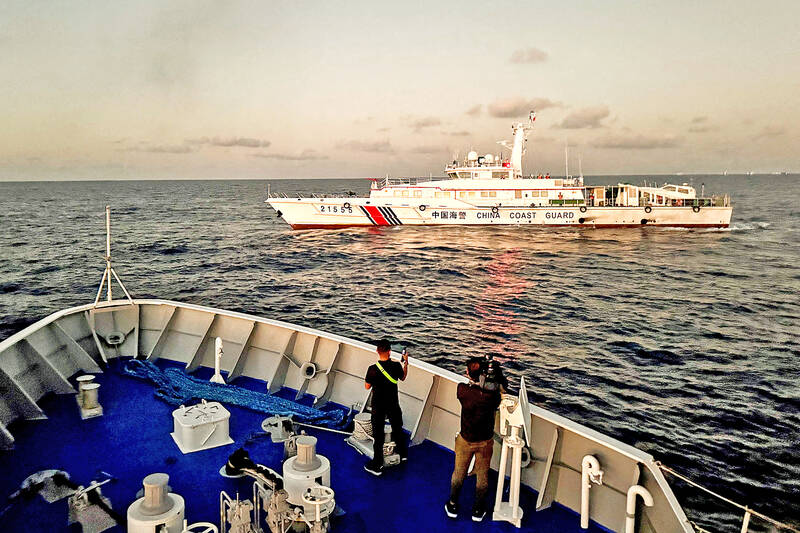New China Coast Guard rules yesterday took effect, allowing it to detain foreigners for trespassing in the disputed South China Sea, where neighbors and the G7 have accused Beijing of intimidation and coercion.
Beijing claims almost the entirety of the South China Sea, brushing aside competing claims from nations, including Taiwan and the Philippines, and an international ruling that its stance has no legal basis.
China deploys coast guard vessels and other boats to patrol the waters and has turned several reefs into militarized artificial islands. Chinese and Philippine vessels have had a series of confrontations in disputed areas.

Photo: Reuters
From yesterday, the China Coast Guard can detain foreigners “suspected of violating management of border entry and exit,” according to the new regulations published online.
Detention is allowed for up to 60 days in “complicated cases,” they say, adding that “foreign ships that have illegally entered China’s territorial waters and the adjacent waters may be detained.”
Manila has accused the Chinese coast guard of “barbaric and inhumane behavior” against Philippine vessels, and Philippine President Ferdinand Marcos last month called the new rules a “very worrisome” escalation.
On Friday, Armed Forces of the Philippines Chief of Staff General Romeo Brawner told reporters that authorities in Manila were “discussing a number of steps to be undertaken in order for us to protect our fishermen.”
Philippine fishers were told “not to be afraid, but just to go ahead with their normal activities to fish there in our exclusive economic zone,” Brawner said.
The G7 criticized what it called “dangerous” incursions by China in the waterway.
“We oppose China’s militarization, and coercive and intimidation activities in the South China Sea,” read a G7 statement at the end of a summit on Friday.
The Philippine Department of Foreign Affairs yesterday said that it has asked the UN Commission on the Limits of the Continental Shelf to formally recognize the extent of its undersea shelf in the South China Sea, off western Palawan province, after more than a decade and a half of scientific research.
The undersea region where the Philippines seeks to formally establish its sovereign rights under the UN Convention on the Law of the Sea (UNCLOS) covers the Spratly Islands (Nansha Islands, 南沙群島), a chain of islands, islets, reefs and atolls that has been fiercely contested over the years by Taiwan, the Philippines, China, Vietnam, Malaysia and Brunei.
“Incidents in the waters tend to overshadow the importance of what lies beneath,” Philippine Ministry of Foreign Affairs Assistant Secretary Marshall Louis Alferez said. “The seabed and the subsoil extending from our archipelago up to the maximum extent allowed by UNCLOS hold significant potential resources that will benefit our nation and our people for generations to come.”
“Today, we secure our future by making a manifestation of our exclusive right to explore and exploit natural resources in our extended continental shelf entitlement,” Alferez said.
Additional reporting by AP

MAKING WAVES: China’s maritime militia could become a nontraditional threat in war, clogging up shipping lanes to prevent US or Japanese intervention, a report said About 1,900 Chinese ships flying flags of convenience and fishing vessels that participated in China’s military exercises around Taiwan last month and in January have been listed for monitoring, Coast Guard Administration (CGA) Deputy Director-General Hsieh Ching-chin (謝慶欽) said yesterday. Following amendments to the Commercial Port Act (商港法) and the Law of Ships (船舶法) last month, the CGA can designate possible berthing areas or deny ports of call for vessels suspected of loitering around areas where undersea cables can be accessed, Oceans Affairs Council Minister Kuan Bi-ling (管碧玲) said. The list of suspected ships, originally 300, had risen to about 1,900 as

Japan’s strategic alliance with the US would collapse if Tokyo were to turn away from a conflict in Taiwan, Japanese Prime Minister Sanae Takaichi said yesterday, but distanced herself from previous comments that suggested a possible military response in such an event. Takaichi expressed her latest views on a nationally broadcast TV program late on Monday, where an opposition party leader criticized her for igniting tensions with China with the earlier remarks. Ties between Japan and China have sunk to the worst level in years after Takaichi said in November that a hypothetical Chinese attack on Taiwan could bring about a Japanese

The WHO ignored early COVID-19 warnings from Taiwan, US Deputy Secretary of Health and Human Services Jim O’Neill said on Friday, as part of justification for Washington withdrawing from the global health body. US Secretary of State Marco Rubio on Thursday said that the US was pulling out of the UN agency, as it failed to fulfill its responsibilities during the COVID-19 pandemic. The WHO “ignored early COVID warnings from Taiwan in 2019 by pretending Taiwan did not exist, O’Neill wrote on X on Friday, Taiwan time. “It ignored rigorous science and promoted lockdowns.” The US will “continue international coordination on infectious

DEEP-STRIKE CAPABILITY: The scenario simulated a PLA drill that turned into an assault on Taiwan’s critical infrastructure, with the launchers providing fire support Taiwan yesterday conducted this year’s first military exercises at Longsiang Base in Taichung, demonstrating the newly acquired High Mobility Artillery Rocket System’s (HIMARS) ability to provide fire support and deep-strike capabilities. The scenario simulated an attack on Penghu County, with HIMARS trucks immediately rolling into designated launch areas and firing barrages at the Wangan (望安) and Cimei (七美) islands, simulating the provision of fire support against invading forces. The HIMARS are supposed to “fire and leave,” which would significantly increase personnel and equipment survivability, a military official said. The drill simulated an exercise launched by the Chinese People’s Liberation Army (PLA) Eastern